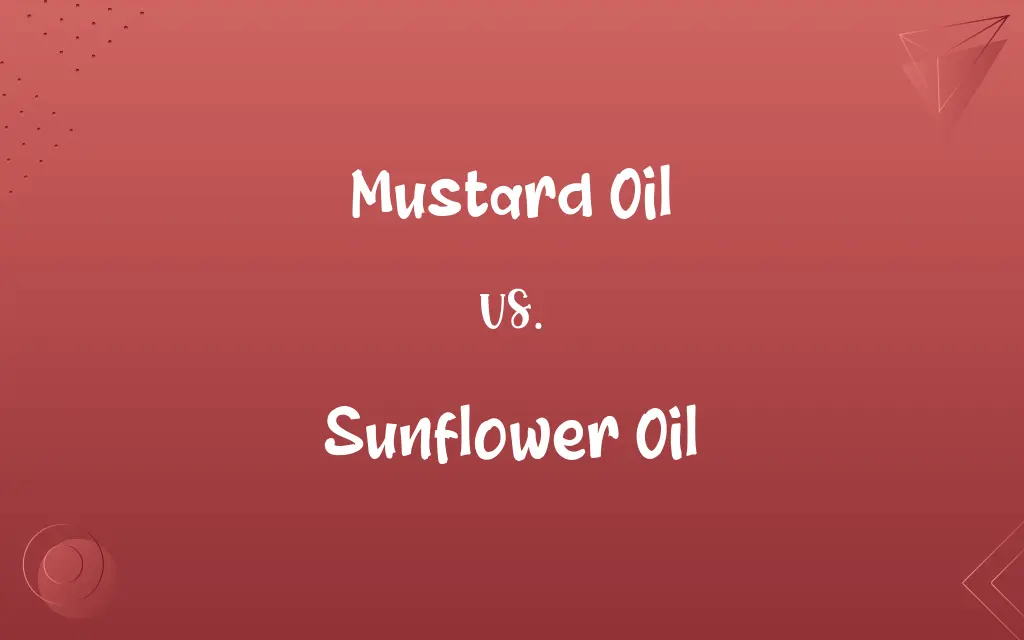Mustard Oil vs. Sunflower Oil: Know the Difference
Mustard Oil is a pungent oil from mustard seeds, often used in Indian cooking, whereas Sunflower Oil is a mild, versatile oil extracted from sunflower seeds.

Key Differences
Mustard Oil, derived from the seeds of mustard plants, is known for its strong aroma and pungency. It's extracted through cold pressing or grinding. Sunflower Oil, on the other hand, comes from sunflower seeds and is obtained by pressing or refining, offering a milder taste and lighter color.
Mustard Oil is a staple in Indian and Bangladeshi cuisine, often used for frying and mustard-based condiments. Its high smoking point makes it suitable for high-heat cooking. Conversely, Sunflower Oil is widely used globally for its neutral taste and is preferred in baking, salad dressings, and light sautéing.
Nutritionally, Mustard Oil is rich in monounsaturated and polyunsaturated fats and has a distinct omega-3 fatty acid profile. Sunflower Oil is high in vitamin E and predominantly contains polyunsaturated fat, making it a heart-healthy option.
Mustard Oil is noted for its potential health benefits like anti-inflammatory properties and aiding in digestion, but it also contains erucic acid, which can be harmful in large quantities. Sunflower Oil is celebrated for its cardiovascular benefits due to its low saturated fat content.
Regionally, Mustard Oil has a significant presence in South Asian cooking, lending a unique flavor to dishes. Sunflower Oil is globally accessible and is often preferred in Western cuisine for its versatility and neutral flavor.
ADVERTISEMENT
Comparison Chart
Origin
Extracted from mustard seeds
Derived from sunflower seeds
Flavor Profile
Strong, pungent, and sharp
Mild and neutral
Cooking Use
Ideal for frying and mustard condiments
Suitable for baking, dressings, and light sautéing
Nutritional Content
High in monounsaturated and polyunsaturated fats
Rich in vitamin E and polyunsaturated fats
Health Impact
Anti-inflammatory, contains erucic acid
Heart-healthy, low in saturated fats
ADVERTISEMENT
Regional Popularity
Prominent in South Asian cuisine
Widely used in global, especially Western, cuisine
Smoking Point
High
Moderate to high
Stability at High Heat
Stable
Relatively stable
Shelf Life
Moderate
Long due to high vitamin E content
Suitability for Frying
Excellent
Good, but better for low to medium-heat cooking
ADVERTISEMENT
Mustard Oil and Sunflower Oil Definitions
Mustard Oil
Mustard Oil is often used in hair and skin care routines for its nourishing properties.
My grandmother swears by Mustard Oil for maintaining healthy hair.
Sunflower Oil
Sunflower Oil is a versatile cooking oil with a mild flavor, suitable for various cuisines.
I prefer Sunflower Oil for baking due to its neutral taste.
Mustard Oil
Mustard Oil acts as a natural preservative in pickles due to its antibacterial properties.
Mustard Oil is essential in preserving these homemade pickles.
Sunflower Oil
Sunflower Oil is commonly used in skincare products for its moisturizing properties.
My favorite moisturizer contains Sunflower Oil for hydration.
Mustard Oil
In traditional medicine, Mustard Oil is used for its anti-inflammatory properties.
She applied Mustard Oil on her joints to relieve arthritis pain.
Sunflower Oil
Sunflower Oil provides essential polyunsaturated fats in a balanced diet.
To increase my intake of healthy fats, I've switched to Sunflower Oil.
Mustard Oil
Mustard Oil is a cooking oil with a pungent taste, commonly used in Indian cuisine.
I used Mustard Oil to fry the spices for the curry.
Sunflower Oil
As a rich source of Vitamin E, Sunflower Oil is beneficial for skin health.
Sunflower Oil is my go-to for a vitamin E-rich diet.
Mustard Oil
Known for enhancing flavor, Mustard Oil is used in various sauces and dressings.
The salad dressing was enriched with the distinct flavor of Mustard Oil.
Sunflower Oil
Its mild flavor makes Sunflower Oil ideal for salad dressings.
This vinaigrette uses Sunflower Oil for a light, neutral base.
Repeatedly Asked Queries
Is Sunflower Oil suitable for salad dressings?
Definitely, its mild flavor is perfect for dressings.
What is Mustard Oil?
A pungent oil extracted from mustard seeds, used in cooking and traditional medicine.
What is Sunflower Oil?
A mild, versatile oil derived from sunflower seeds, used in cooking and skincare.
Is Sunflower Oil rich in any vitamins?
Yes, it's a great source of vitamin E.
Is Sunflower Oil a good option for frying?
It's suitable for low to medium-heat frying.
Can Mustard Oil be used for frying?
Yes, its high smoking point makes it suitable for high-heat cooking.
Does Mustard Oil contain healthy fats?
Yes, it's rich in monounsaturated and polyunsaturated fats.
Can Mustard Oil be used for hair care?
Yes, it's often used for its nourishing properties for hair.
Are there any risks associated with Mustard Oil?
It contains erucic acid, which can be harmful in large quantities.
Is Sunflower Oil good for baking?
Absolutely, its neutral taste makes it ideal for baking.
What cuisines commonly use Mustard Oil?
It's a staple in Indian and Bangladeshi cuisines.
How is Sunflower Oil processed?
It's obtained by pressing or refining sunflower seeds.
Is Sunflower Oil environmentally sustainable?
Generally, it's considered more sustainable than some other oils.
How does Sunflower Oil benefit skin?
Its vitamin E content is beneficial for skin health.
Can Mustard Oil be used in pickling?
Yes, its antibacterial properties make it suitable for preserving pickles.
What's the shelf life of Sunflower Oil?
It has a long shelf life, thanks to its high vitamin E content.
Can Mustard Oil aid in digestion?
Yes, it's known for its digestive benefits.
Is Sunflower Oil a healthy choice for heart?
Yes, due to its low saturated fat content.
What makes Mustard Oil unique in flavor?
Its strong, pungent taste sets it apart.
Is Mustard Oil commonly used in Western cuisine?
It's more prevalent in South Asian cuisine.
Share this page
Link for your blog / website
HTML
Link to share via messenger









































































